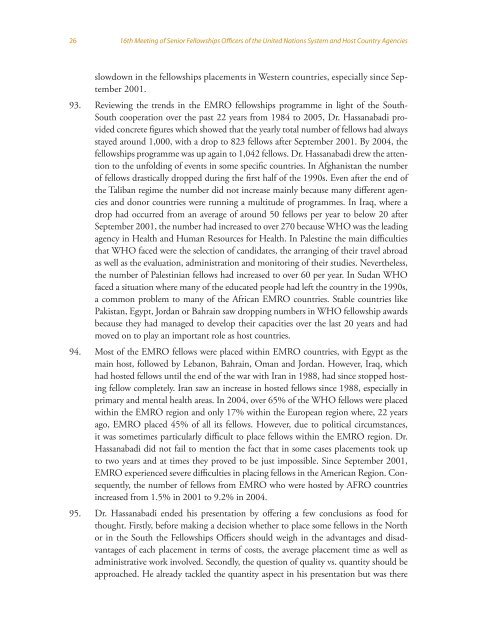16th Meeting of Senior Fellowships Officers of the ... - Development
16th Meeting of Senior Fellowships Officers of the ... - Development
16th Meeting of Senior Fellowships Officers of the ... - Development
Create successful ePaper yourself
Turn your PDF publications into a flip-book with our unique Google optimized e-Paper software.
26<br />
<strong>16th</strong> <strong>Meeting</strong> <strong>of</strong> <strong>Senior</strong> <strong>Fellowships</strong> <strong>Officers</strong> <strong>of</strong> <strong>the</strong> United Nations System and Host Country Agencies<br />
slowdown in <strong>the</strong> fellowships placements in Western countries, especially since September<br />
2001.<br />
93. Reviewing <strong>the</strong> trends in <strong>the</strong> EMRO fellowships programme in light <strong>of</strong> <strong>the</strong> South-<br />
South cooperation over <strong>the</strong> past 22 years from 1984 to 2005, Dr. Hassanabadi provided<br />
concrete figures which showed that <strong>the</strong> yearly total number <strong>of</strong> fellows had always<br />
stayed around 1,000, with a drop to 823 fellows after September 2001. By 2004, <strong>the</strong><br />
fellowships programme was up again to 1,042 fellows. Dr. Hassanabadi drew <strong>the</strong> attention<br />
to <strong>the</strong> unfolding <strong>of</strong> events in some specific countries. In Afghanistan <strong>the</strong> number<br />
<strong>of</strong> fellows drastically dropped during <strong>the</strong> first half <strong>of</strong> <strong>the</strong> 1990s. Even after <strong>the</strong> end <strong>of</strong><br />
<strong>the</strong> Taliban regime <strong>the</strong> number did not increase mainly because many different agencies<br />
and donor countries were running a multitude <strong>of</strong> programmes. In Iraq, where a<br />
drop had occurred from an average <strong>of</strong> around 50 fellows per year to below 20 after<br />
September 2001, <strong>the</strong> number had increased to over 270 because WHO was <strong>the</strong> leading<br />
agency in Health and Human Resources for Health. In Palestine <strong>the</strong> main difficulties<br />
that WHO faced were <strong>the</strong> selection <strong>of</strong> candidates, <strong>the</strong> arranging <strong>of</strong> <strong>the</strong>ir travel abroad<br />
as well as <strong>the</strong> evaluation, administration and monitoring <strong>of</strong> <strong>the</strong>ir studies. Never<strong>the</strong>less,<br />
<strong>the</strong> number <strong>of</strong> Palestinian fellows had increased to over 60 per year. In Sudan WHO<br />
faced a situation where many <strong>of</strong> <strong>the</strong> educated people had left <strong>the</strong> country in <strong>the</strong> 1990s,<br />
a common problem to many <strong>of</strong> <strong>the</strong> African EMRO countries. Stable countries like<br />
Pakistan, Egypt, Jordan or Bahrain saw dropping numbers in WHO fellowship awards<br />
because <strong>the</strong>y had managed to develop <strong>the</strong>ir capacities over <strong>the</strong> last 20 years and had<br />
moved on to play an important role as host countries.<br />
94. Most <strong>of</strong> <strong>the</strong> EMRO fellows were placed within EMRO countries, with Egypt as <strong>the</strong><br />
main host, followed by Lebanon, Bahrain, Oman and Jordan. However, Iraq, which<br />
had hosted fellows until <strong>the</strong> end <strong>of</strong> <strong>the</strong> war with Iran in 1988, had since stopped hosting<br />
fellow completely. Iran saw an increase in hosted fellows since 1988, especially in<br />
primary and mental health areas. In 2004, over 65% <strong>of</strong> <strong>the</strong> WHO fellows were placed<br />
within <strong>the</strong> EMRO region and only 17% within <strong>the</strong> European region where, 22 years<br />
ago, EMRO placed 45% <strong>of</strong> all its fellows. However, due to political circumstances,<br />
it was sometimes particularly difficult to place fellows within <strong>the</strong> EMRO region. Dr.<br />
Hassanabadi did not fail to mention <strong>the</strong> fact that in some cases placements took up<br />
to two years and at times <strong>the</strong>y proved to be just impossible. Since September 2001,<br />
EMRO experienced severe difficulties in placing fellows in <strong>the</strong> American Region. Consequently,<br />
<strong>the</strong> number <strong>of</strong> fellows from EMRO who were hosted by AFRO countries<br />
increased from 1.5% in 2001 to 9.2% in 2004.<br />
95. Dr. Hassanabadi ended his presentation by <strong>of</strong>fering a few conclusions as food for<br />
thought. Firstly, before making a decision whe<strong>the</strong>r to place some fellows in <strong>the</strong> North<br />
or in <strong>the</strong> South <strong>the</strong> <strong>Fellowships</strong> <strong>Officers</strong> should weigh in <strong>the</strong> advantages and disadvantages<br />
<strong>of</strong> each placement in terms <strong>of</strong> costs, <strong>the</strong> average placement time as well as<br />
administrative work involved. Secondly, <strong>the</strong> question <strong>of</strong> quality vs. quantity should be<br />
approached. He already tackled <strong>the</strong> quantity aspect in his presentation but was <strong>the</strong>re

















